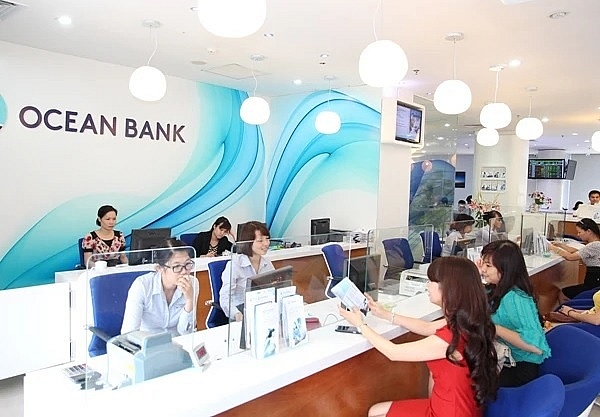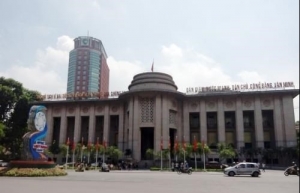Weak bank reform to facilitate expansion activities
At a late April AGM, VPBank chairman Ngo Chi Dung addressed concerns regarding the bank’s involvement in restructuring a zero-VND bank - a financial institution under special control by the State Bank of Vietnam (SBV), acquired for zero due to their negative equity.
The financial landscape includes four such banks: OceanBank, CBBank, GPBank, and DongABank.
 |
| Weak bank reform to facilitate expansion activities, photo: OceanBank |
“From a strictly financial standpoint, most banks are reluctant to undertake such restructuring. However, VPBank’s participation is motivated by broader strategic goals,” Dung said.
Dung pointed out that the involvement of strategic shareholder SMBC has fortified VPBank with a substantial capital base, enabling its participation in the restructuring efforts.
“Although this restructuring does not offer immediate financial returns, it facilitates our expansion strategy. Notably, it allows us to pursue higher credit growth and potentially increase our foreign ownership limit beyond the current 30 per cent cap,” he explained.
Banks are generally capped at a 30 per cent foreign ownership limit, but with strategic investors, VPBank aims to elevate this threshold. Dung said that participating in the restructuring of zero-VND banks could enable it to extend foreign ownership, which is crucial for scaling operations and boosting capital.
In Vietnam’s challenging financial landscape, pivotal steps are being taken to restructure financially vulnerable institutions. Nguyen Thanh Tung, CEO of Vietcombank, announced that the bank has finalised its restructuring plan, which is now pending approval from the SBV. This move is part of a broader strategy to ensure seamless transitions and adherence to regulatory timelines.
“We have developed specific strategies to proactively ensure the transition is managed smoothly,” Tung said.
In preparation, Vietcombank is refining its network and evaluating its human resources to bridge any skill gaps, simultaneously establishing tailored training programmes to swiftly meet standards. Moreover, the bank has formed dedicated subcommittees to assist in the transfer of weak financial institutions.
“Transfers are planned for 2024. Over the long term, acquiring weaker banks opens doors for potential strategies such as share sales or mergers,” Tung explained.
Meanwhile, Nguyen Thi Phuong Thao, vice chairwoman at HDBank, stated at its AGM in late April that the bank is among four chosen by the SBV due to its strong financial health and effective operations.
“About 6-7 years ago, when we received the proposal from the SBV, we arranged and prepared to engage seriously. Accepting this role underlines the bank’s commitment and opens up transformative growth opportunities,” Thao said.
“Supporting this initiative allows HDBank to utilise additional favourable mechanisms to increase our annual credit growth limits, positioning us to become one of the top banks in the country within the next five years,” Thao added.
Luu Trung Thai, chairman of MB, views this as an opportunity to explore new developmental pathways, notably in credit growth and management capabilities.
“We are prepared for the assigned tasks, just awaiting government approval,” Thai reported at the bank’s AGM last month. “MB is engaging in various collaborative efforts aimed at supporting targeted commercial banks, with mandatory transfers expected to commence this year. Post-transfer, the weak bank will continue to operate independently under MB, with future options for merging or divesting after restructuring.”
While the final destinations for these banks remain undisclosed, Vietcombank is actively providing comprehensive support to CBBank, covering aspects of governance, technology, products, services, and branding.
Meanwhile, MB’s leadership has disclosed that the bank it is acquiring has accumulated losses of approximately $833 million, along with a non-performing loan ratio of 47 per cent. Among these institutions, OceanBank, acquired for zero, faces similar financial challenges.
The restructuring process, while beneficial, is complicated by significant risks, including the potential rise in non-performing loans, unresolved corporate bond debts, and challenges in achieving robust credit growth for production.
“Given the complexities and impending risks, the timing and execution of these transfer plans must be judiciously considered to mitigate any negative impacts on the broader banking system and the economy,” noted one financial sector expert to VIR.
At the SBV’s April report to the National Assembly, the recurrent use of phrases such as “finalising” and “submitting for approval” highlighted the sluggish progress in handling weak banks, a theme that has persisted over the years.
Vu Hong Thanh, Chairman of the National Assembly’s Economic Committee, expressed frustration with the slow progress of the restructuring project for the 2021-2025 period. “In addition to the four mandatory acquisition banks, now including SCB, we are spending a significant amount of money daily to support these struggling banks, which is proving to be very costly,” Thanh remarked.
 | SBV issues another 20 trillion VND worth of treasury bills The State Bank of Vietnam (SBV) on September 27 continued to offer 28-day treasury bills worth 20 trillion VND (833 million USD) through an auction. |
 | MB finalises strategy for acquisition of distressed bank At Military Bank's (MB) AGM on April 19, CEO Pham Nhu Anh revealed that the bank has completed all necessary procedures for the compulsory transfer of a troubled bank, with a target completion date set for this year or 2025, contingent on government approval. |
What the stars mean:
★ Poor ★ ★ Promising ★★★ Good ★★★★ Very good ★★★★★ Exceptional
Related Contents
Latest News
More News
- Private capital funds as cornerstone of IFC plans (February 20, 2026 | 14:38)
- Priorities for building credibility and momentum within Vietnamese IFCs (February 20, 2026 | 14:29)
- How Hong Kong can bridge critical financial centre gaps (February 20, 2026 | 14:22)
- All global experiences useful for Vietnam’s international financial hub (February 20, 2026 | 14:16)
- Raised ties reaffirm strategic trust (February 20, 2026 | 14:06)
- Sustained growth can translate into income gains (February 19, 2026 | 18:55)
- The vision to maintain a stable monetary policy (February 19, 2026 | 08:50)
- Banking sector faces data governance hurdles in AI transition (February 19, 2026 | 08:00)
- AI leading to shift in banking roles (February 18, 2026 | 19:54)
- Digital banking enters season of transformation (February 16, 2026 | 09:00)

 Tag:
Tag:



















 Mobile Version
Mobile Version